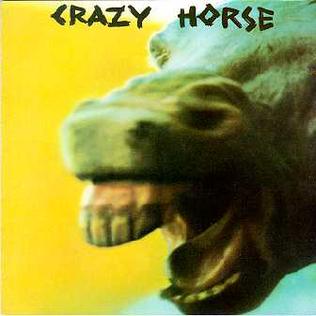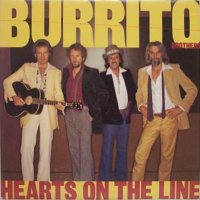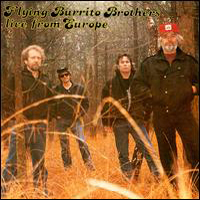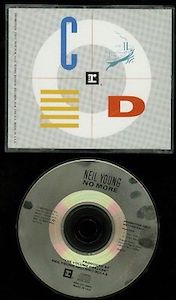
The Flying Burrito Brothers are an American country rock band, best known for their influential 1969 debut album, The Gilded Palace of Sin. Although the group is perhaps best known for its connection to band founders Gram Parsons and Chris Hillman, the group underwent many personnel changes and has existed in various incarnations. A lineup with no original members currently performs as The Burrito Brothers.
"Sedan Delivery" is a song written by Neil Young that was first released on his 1979 album with Crazy Horse, Rust Never Sleeps.

"Cinnamon Girl" is a song by Neil Young. It debuted on the 1969 album Everybody Knows This Is Nowhere, which was also Young's first album with backing band Crazy Horse.
"Danger Bird" is a song written by Neil Young. It was first released on his 1975 album with Crazy Horse, Zuma. A live version was also released on the 1997 album Year of the Horse.

Crazy Horse is the debut album by Crazy Horse, released in 1971 by Reprise Records. It is the only album by the band to feature Danny Whitten recorded without Neil Young, and it peaked at #84 on the Billboard 200 album chart.
Gene Victor Parsons is an American drummer, banjo player, guitarist, singer-songwriter, and engineer, best known for his work with the Byrds from 1968 to 1972. Parsons has also released solo albums and played in bands including Nashville West, the Flying Burrito Brothers, and Parsons Green. Along with guitarist Clarence White, he is credited with inventing the B-Bender —a device which allows a guitarist to emulate the sound of a pedal steel guitar. The device is often referred to as the Parsons/White B-Bender, a trademarked name.

Flying Again is the fourth studio album by the country rock group The Flying Burrito Brothers, released in 1975.

Hearts on the Line is an album by the country rock group The Burrito Brothers, released in 1981.

Live from Europe is a live album by the country rock group The Flying Burrito Brothers, released in 1986. It contains songs recorded live for a Dutch radio broadcast and features the same lineup as Cabin Fever. Skip Battin would leave the band mid-1986 and be replaced with David Vaught for some shows.
Swampwater was an American country rock band, that formed and started out initially as Linda Ronstadt’s backing group in the late 1960s, soon after she went solo. They are famous for incorporating cajun and swamp rock elements into their music. Its members included cajun fiddler Gib Guilbeau, John Beland, before either of them joined The Flying Burrito Brothers, with Stan Pratt, Thad Maxwell, and Eric White. Swampwater would go on to back Ronstadt in 1971 on TV's The Johnny Cash Show, and their appearance on the show would help Swampwater secure a recording contract with RCA.
"Powderfinger" is a song written by Neil Young, first released on his 1979 album Rust Never Sleeps. It subsequently appeared on several of Young's live recordings. A 2014 Rolling Stone special issue on Young ranked it as Young's best song ever.

Eye of a Hurricane is the 6th studio album by The Flying Burrito Brothers, released in 1994. In the early 1990s, longtime Flying Burrito Brothers members John Beland, Gib Guilbeau, Sneaky Pete Kleinow and Chris Ethridge teamed up with Australian rock legend, Brian Cadd and former Elvis Presley drummer, Ronnie Tutt, to form a brand new version of Burritos. The sessions took place at Brian Cadd's studio in Franklin, Tennessee and the material was mostly written by Beland, Cadd and Guilbeau, with one song contributed by Ethridge. Beland and Cadd produced the album for Magnum Records, in London England. In support of the album, Beland, Cadd, Kleinow and Guilbeau toured Europe in the early 90s, playing clubs and concerts. Ethridge surprisingly vanished only days before the tour, leaving the band to quickly hire Nashville bassist Larry Gadler, as well as Bobby Bare's drummer Gary Kubal. The tour yielded a live album called Live in Europe, also on Magnum.
Floyd August "Gib" Guilbeau was an American Cajun country rock musician and songwriter. As a member of Nashville West, Swampwater, The Flying Burrito Brothers, and later The Burrito Brothers, Guilbeau helped pioneer the fusion of rock and country music in the 1960s.

California Jukebox is the 7th studio album by The Flying Burrito Brothers, released in 1997. The album is a fair mix between original and cover songs. The cover songs are an interesting mix between older and more established acts such as Neil Young and Buck Owens as well as newer alt-country acts such as Son Volt and The Jayhawks. The album also features guest appearances by Waylon Jennings, Charlie Louvin and former band members such as Brian Cadd and Al Perkins.

Georgia Peach is the first release by Burrito Deluxe. After John Beland retired The Flying Burrito Brothers in 2000, original member of that band "Sneaky" Pete Kleinow put together a new lineup with Carlton Moody and Tommy Spurlock. As Beland still had rights to the name, the band decided to call itself Burrito Deluxe after the Flying Burrito Brothers' second album. In addition to a mixture of original tunes and covers, the album contains several redone version of Flying Burrito Brothers and other songs associated with Gram Parsons.

"No More" is a song written by Neil Young that was first released on his 1989 album Freedom. Although not released commercially as a single, it reached #7 on the Billboard Mainstream Rock chart. Young performed the song live on a Saturday Night Live performance on September 30, 1989.

John Edward Beland is an American songwriter, session guitarist, recording artist, producer and author. Beland's career as guitarist started out in Los Angeles in the late 1960s, playing sessions and local live gigs with Kris Kristofferson, as well as future Eagles members, Glenn Frey and Bernie Leadon. Beland's first major break came in 1970, when he played lead guitar for a young Linda Ronstadt. He helped Ronstadt put together her first serious solo band, Swampwater. Along with bandmates Gib Guilbeau, Thad Maxwell and Stan Pratt, Swampwater toured the country with Ronstadt, appearing with her on many notable television shows including The Johnny Cash Show. Swampwater recorded two landmark country-rock albums for Starday-King and RCA Records. The group was one of the first Los Angeles bands to record in Nashville, known for their smooth harmonies and Cajun rock style.
"I Believe in You" is a song written by Neil Young that was first released on his 1970 album After the Gold Rush. It has also been covered by other artists, including Linda Ronstadt, Robin Zander and Rita Coolidge. Coolidge's version was released as a single and was a minor hit in Canada.

"Everybody Knows This Is Nowhere" is a song written by Neil Young that was originally released as the title track of his 1969 album with Crazy Horse, Everybody Knows This Is Nowhere. The song was written earlier, and a different version was originally considered for Young's 1968 solo debut album Neil Young

"Come On Baby Let's Go Downtown", also known as "(Come On Baby Let's Go) Downtown" or "Downtown", is a song written by Danny Whitten, possibly in collaboration with Neil Young, that was first released on Crazy Horse's 1971 album Crazy Horse. A live version was later released on multiple Neil Young albums, most famously on his 1975 album Tonight's the Night, and then on his 2006 album Live at the Fillmore East. Phish has covered the song in concert.













